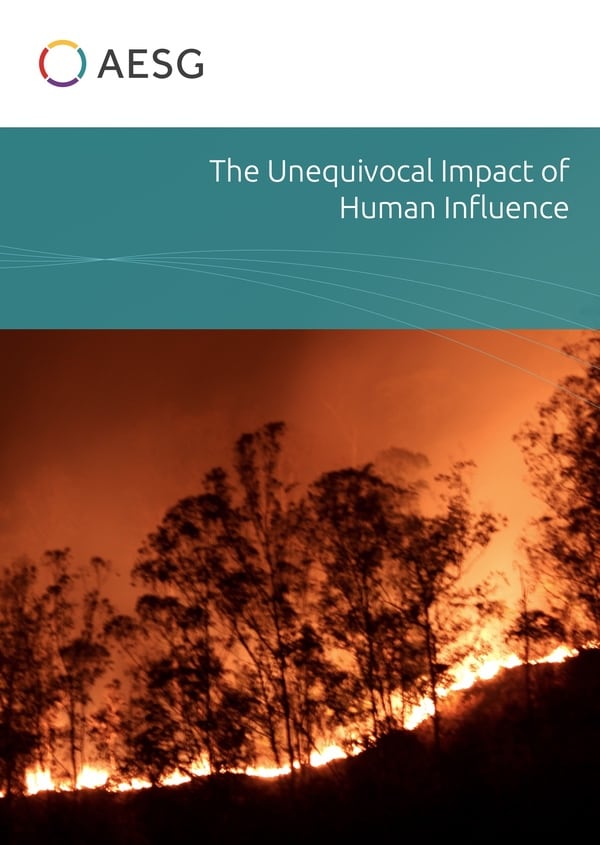
Following the publication of the latest IPCC report on Climate Change, there are several key takeaways that we should be aware of. The standout message is clear however, Climate Change and extreme weather events are unequivocally linked to human activities. This is the first time that the IPCC have made such a definitive statement on the root cause of the climate crisis, leaving nowhere to hide.
“It Is Unequivocal That Human Influence Has Warmed the Atmosphere, Ocean, and Land.”
The damning new report covers a range of predicted environmental impacts anticipated across multiple Climate Change scenarios. These range from the most optimistic outlooks – an anticipated reaching of the 1.5°C target by the early to mid-2030’s, with an opportunity to bring the increase back down to 1.4°C by 2100 if all possible actions are taken – to the most likely worse case scenario – a temperature increase of 4°C with a significant increase in extreme weather events, the melting of Arctic sea ice and permafrost and substantial sea level rise.
The lowest emission scenario modelled in the report assumes the achievement of net zero emissions by 2050. At the time of writing this piece, only 14 countries have legislated a net zero emissions target by 2050 (or sooner), while a further 37have commitments in proposed legislation/policy documents. Of the 3 largest contributors to global emissions, China has a target of Net Zero by 2060 in policy documentation; the US has a target of 2050 in policy documentation; and the EU has legislated a target of 2050. In response to this latest report, all countries that signed up to the Paris Agreement will now need to re-align with the 2050 deadline in order to meet the commitments made.
As built environment professionals we have an important role to play in enabling, supporting and driving positive change. We must start assessing the whole life carbon impact of all new development projects, identifying new and improved ways of building better to help and not hinder the reduction of emissions. Reducing, or where possible completely eliminating, carbon emissions must become a key consideration in decision making, making use of our existing building stock, modifying, updating, retrofitting and repurposing in imaginative ways to limit our impact. We need to urgently transition to a position whereby all new developments are built to net zero carbon standards within this decade as well as transition our existing buildings and cities to net zero carbon by 2050. This is no easy feat and will take drastic, immediate and far-reaching action. There are reasons to be optimistic however. The technology, human ingenuity and for the first time, the finance is in place to make this happen. But we need to act fast and not miss this opportunity as we will not be given another chance.
The presentation of such undeniable evidence, whilst alarming, also holds a reassuring message. The unavoidable impacts of Climate Change will be realised and we will have to learn to adapt and mitigate the damage already done where possible.However, the science does demonstrate that, should we take unprecedented action to reduce our emissions, the worst impacts may be avoided.
“A message is being shared and the challenge is clear, all possible action must be taken now by all in order to prevent irreversible and devastating damage! It is not too late to act, but this final warning must be heeded by policy makers and industry leaders alike to safeguard the future of our people and planet.”

Partner and Global Sustainability Director, AESG
Phillipa is AESG’s Partner and Global Director of Sustainability. Having worked on some of the most complex and prestigious sustainability projects in AESG’s portfolio, including the development and implementation of Dubai’s Demand Side Management programs and multiple pavilions at Dubai EXPO 2020, Phillipa has gained a broad and thorough understanding of the energy and sustainability sector, both locally and internationally, and is passionate about furthering the global Sustainable Development Goals.
How can AESG help?
AESG is a specialist consultancy, engineering and advisory firm headquartered in London, Singapore and Dubai.Our vision is to transform specialist consultancy, providing solutions for a more sustainable world. As signatories to the WorldGBC’s advancing net zero buildings commitment, AESG is committed to supporting the construction industry to reach the Net Zero Carbon Emission targets by 2030 and 2050. With our ‘Pathway to Net Zero’ designed to determine and evaluate the options available for reducing both the embodied and operational Carbon footprint of buildings, we provide our clients with an optional pathway to achieving net zero carbon buildings.
For further information regarding our specialist consultancy services, feel free to contact us